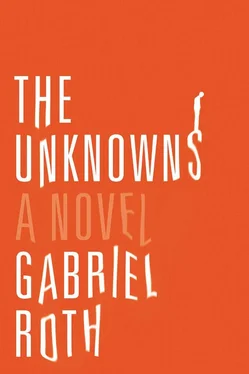Of course I can’t say any of this to her. What if everything she believes is true? Absence of evidence is not evidence of absence. Her mother dies and leaves her alone with her abusive father. She endures torture, grows up a stranger to herself. She struggles to know the truth, to put aside her defenses and live honestly in the face of the unbearable. And her lover demands proof? Accuses her of fabricating her memories? Monstrous.
I keep imagining that I’m about to stumble on her father’s secret diary or her therapist’s case notes, whereupon the truth will come out. This will not happen. Nor will some profound and obviously authentic instinct well up in Maya and make itself available for consultation. Maya has no special access to the truth, and nor do I. The only person who does is Donald Marcom, and his word is the least credible of all.
His gallery’s website displays only photographs of European bronzes and bas-reliefs. Subsequent search results include abstracts of articles in academic journals and deal reports in the trade press. What would happen if I were to ask him? Would I be able to tell, from something desperate and honest in his eyes, if he was lying?
Maya’s investigation of the towing company will run in this week’s paper. She has uncovered a predictable but still newsworthy pattern of infractions: improper towing, overbilling, low-level graft. Today she called the company’s owner and presented him with the list of charges.
“He just kept saying, It’s bullshit, it’s all bullshit , over and over,” she says. “I said, Can you be more specific ? and he was like, Yeah, specifically, your story is bullshit , and then he hung up the phone.”
I’m visiting her at the paper, which looks disappointingly like the office of any other midsized business. It’s past nine and the newsroom itself is deserted, but copy editors and layout artists huddle in peripheral warrens. Maya filed her story half an hour ago, and now we’re sitting at her cubicle eating takeout pasta from foil containers. Her editor is in his office with the sliding glass door shut, his feet on his desk, the printout in his hand, a ballpoint pen sticking out of his mouth. At any moment he may pull Maya away to clarify a sentence, resolve an inconsistency in the spelling of a name, draft an explanatory sidebar.
“How are you going to feel tomorrow, when it comes out?” I ask.
“A little edgy,” she says. “Not about the story — the story’s good. I’m just afraid he’s going to call and yell at me.” She tears a bread roll in half and swirls it around in my leftover vodka sauce.
“So what if he does call you?” I say. “You can’t just hang up?”
“I could,” she says. “The thing is, when people get upset they let stuff slip out. You’re meant to start taking notes, ask questions. One time I heard Angela on the phone with some guy who was yelling so loud I could hear his voice over the receiver. He goes, This is off the record, bitch , and starts laying into her. And she goes, Sorry, I’m not going to talk to you off the record. Anything you say I’m going to quote you . He just lit into her, out of control, and she was grinning like crazy while she was typing it up. I can’t do that. I get too freaked out when people yell at me. For obvious reasons.”
At this last turn toward self-analysis she seems to switch modes, from casual chat to something more substantive. If her memories of abuse are correct, the moment calls for a swift, smooth expression of understanding and sympathy, nothing dramatic or intrusive. But what if they’re not correct? Does she then, on some level, perceive sympathy as gullibility, or does that presume some nonexistent stratum of accurate knowledge? As I wrestle with this problem I’m staring blankly at my empty pasta container, which surely seems callous whether her autobiographical narrative is genuine or fantastic. Acting like I believe her is probably the lower-risk strategy and the one to adopt in perpetuity. But in addition to possibly looking like a dupe I’d likely be niggled by doubt, which would be a drag on my performance and could on any occasion erupt into an incident of poor judgment. Maya is looking at me in a way that makes me worry about my facial expression. I have been silent for almost half a minute, which makes it too late to respond without justifying the caesura. I could change the subject, which would be a gross conversational foul but would move us to safer ground, if I could construct a coherent sentence on any topic other than the one I’m thinking about.
“Are you OK?” she asks.
“Fine!” I say. “Tired. Up late last night. Sorry. That’s too bad. About getting freaked out when people yell at you. That must be hard. Because of — it must be really hard.” She’s peering at me now with frank curiosity, as though I’m a species of animal she’s never seen before.
A shout from the editor breaks the silence. “Get some rest,” Maya says, squeezing me on the arm.
I walk home, past unfinished lofts stunted by the crash, and distract myself by thinking about Bill’s new project. I half wish he’d ask for my help, but if there’s no user-facing design I wouldn’t have much to contribute: multithreading is a notoriously difficult field in which I have no real experience.
Inside my apartment I lie awake again, wondering whether Donald Marcom sleeps and what it means if he does. Then I give up. I am searching for flights to Los Angeles when I realize what I’m doing. I take my hands from the keyboard and press on my eyelids. This can solve nothing. Pedophilia isn’t visible on the skin like a rash. But the point is not to interrogate or diagnose him; the point is to fill in the empty space in Maya’s story. I have to address this, and I can’t address it alone, and I can’t raise it with her. And Donald Marcom, of Donald Marcom Fine Arts, 20977 Wilshire Boulevard, Los Angeles, is the only other person here.
Transmuting the problem into the world of practicalities, of web searches and plane tickets and my credit card’s three-digit security code, brings on a surge of exhaustion. I barely reach my bed and manage to remain there for nine hours, gorging on unconsciousness, emerging every few hours and plunging back down again.
When I’m finally awake things feel different. Sitting at the kitchen island drinking coffee it’s possible to believe that any problem can be solved by a man of action with adequate resources. I can get from my apartment to Donald Marcom’s gallery in an hour and a half. I will go to Los Angeles in two days, learn what can be learned, for whatever that’s worth. The sun streams in over Potrero Hill and turns the dust motes in the air into tiny stars.
The gallery is in a glorified strip mall — a fancy white minicomplex with valet parking and a sushi restaurant and a dental practice — behind frosted windows on which DONALD MARCOM FINE ARTS has been stenciled in a discreet sans-serif face. This physical evidence of the man’s existence in the world is jarring. It would be easy to turn around, reclaim my rental car, drive straight back to the airport, call his secretary to tell her I’ve been waylaid. We spoke when I made the appointment yesterday: she had the voice of an older woman, hired for her skill and competence rather than her client appeal. I told her I was going to be in Los Angeles on short notice and was keen to see the collection. She started asking questions, being chatty; I actually thought, Wow, she’s friendly , before I realized she was trying to figure out whether I was worth her boss’s time. Invoking Silicon Valley freed up an hour in his schedule. I remember this successful bit of self-impersonation as I press the buzzer, then step back and wait for her to open the door, tall and canary-blond and professional, to admit me into the presence of the unknown.
Читать дальше












